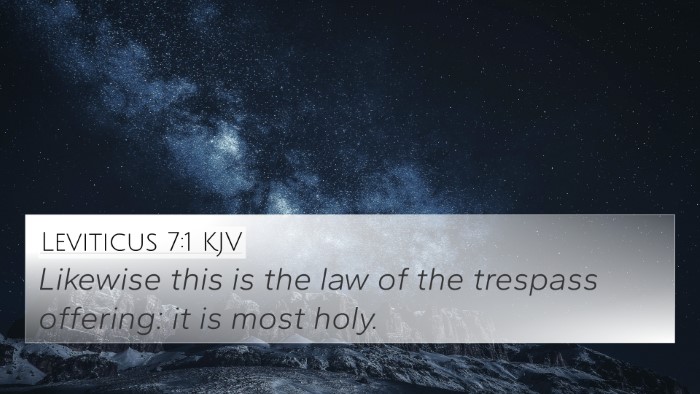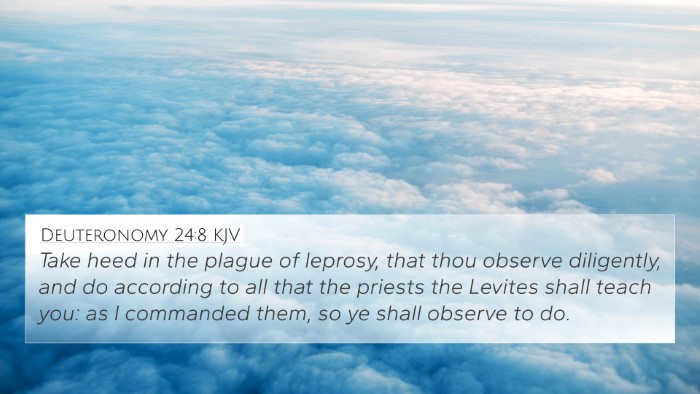Understanding Leviticus 14:54
Leviticus 14:54 states: "This is the law for all manner of plague of leprosy, and scall," teaching us about the laws and guidelines that God provided for the people of Israel concerning infectious diseases and ceremonial cleansing. This verse encapsulates the instructions given to the priests concerning the identification and management of these afflictions, as part of a larger system of Clean and Unclean.
Summary of Biblical Meaning
The significance of this verse lies in its place within the broader context of Levitical law, which is aimed at maintaining holiness and order in the community. This framework is vital for understanding God’s desire for purity.
Commentary Insights
-
Matthew Henry: In his commentary, Henry notes that this section reflects God's preventative measures for the health and purity of the Israelite community. The law of leprosy serves as a reminder of the consequences of sin and the need for communal purity.
-
Albert Barnes: Barnes explains that this verse and surrounding text are part of a broader apodictic law, wherein God sets clear guidelines for His people. The “law” mentioned in the verse serves as a divinely sanctioned standard for discernment and corrective action.
-
Adam Clarke: Clarke emphasizes the rituals outlined in the previous verses and how they relate to both physical and spiritual health, suggesting that the management of leprosy is not just about disease control, but about maintaining the integrity of the covenant relationship with God.
Related Themes and Cross-References
Leviticus 14:54 connects with numerous other biblical texts, providing insight into the thematic development of holiness, sin, and divine statutes throughout Scripture. Some important cross-references include:
- Leviticus 13:1-46 - Details the diagnosis and rules pertaining to leprosy, providing the background for understanding the law of 14:54.
- Numbers 5:2-3 - Discusses the removal of the unclean from the camp, emphasizing communal purity.
- Deuteronomy 24:8 - Mentions leprosy in the context of priestly duties and the importance of thorough examination and judgment.
- 1 Peter 2:9 - Reflects the New Testament understanding of believers as a "chosen generation," pursuing holiness.
- Matthew 8:2-3 - Relates to Jesus healing a leper, showcasing the fulfillment of the law through grace.
- Luke 17:12-14 - The ten lepers who are healed by Jesus, illustrating the continuity between Jesus' ministry and these Levitical laws.
- Hebrews 7:18-19 - Discusses the inadequacy of the Old Covenant sacrificial system while affirming the need for a new way, highlighting the transition from physical cleansing to spiritual redemption.
The Importance of Cross-Referencing
Engaging in a comparative Bible verse analysis enhances our understanding of Scripture. By using tools for Bible cross-referencing, we can uncover significant connections between biblical texts, allowing deeper insights into themes such as divine law, community, health, and holiness.
Practical Understanding
For those seeking deeper biblical understanding, using a Bible concordance or cross-reference Bible study can illuminate the intricate web of connections throughout Scripture. Here are a few methods to implement cross-referencing effectively:
-
Using a Bible Cross-Reference Guide: Many Bibles have built-in references that link related verses, making it easier to explore themes and connections.
-
Study Groups: Participating in discussions about how different scriptures relate can provide communal insights and foster understanding.
-
Online Tools: Websites and apps offer cross-reference Bible systems that facilitate searches by theme, topic, or specific verses.
-
Comparative Studies: Explore links between the Old and New Testament, identifying patterns and thematic continuities, like the ongoing discussion of cleanliness and purity.
Conclusion
Tying Leviticus 14:54 into a larger framework of biblical narrative allows for greater grasp of the concepts of divine law and societal holiness. As we engage with the text through various lenses and connections, we can appreciate how God’s instructions in the Old Testament inform and enrich our understanding of New Testament teachings. Seeking cross-references not only aids in personal study but enhances preaching, teaching, and understanding of God's unfolding story.
















